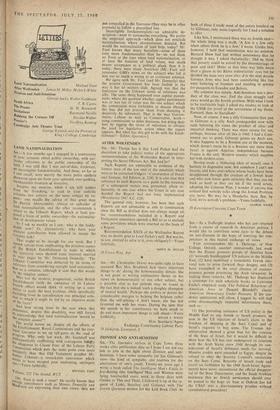Land Nationalisation Michael Fool After Wolfenden James M. Miller, Myles
J. White
Zionism and Anti-Semitism George Sacks, Walter Goldstein
South Africa T. R. Curtin The Proms G. H. Bosworth Invitations Raymond Neville Rubbing the Corners Off Nicolas Walter Prunier's • • Geoffrey Keating Cambridge Arts Theatre Trust
George Rylands and the Provost of King's College, Cambridge LAND NATIONALISATION
8. 10.—A few months ago I engaged in a controversy nl Your columns about public ownership, with par- ticular reference to the public ownership of the land. I was told that I was out-of-date, irrelevant, an incorrigible fundamentalist. And these, so far as I can recall, were merely the more polite epithets showered upon me from your splendid, ever-gushing, illethaustible fountain of invective.
Imagine my surprise, while I am still sodden from the drenching, to read in your catholic columns two articles on the same subject by ex- perts: one recalls the advice of that great man Sir Patrick Abercrombie. always an upholder of land nationalisation, and the other recommends a return to the Uthwatt Report, which at least pro- Posed a form of public ownership—the nationalisa- tion of development values.
So I ask as meekly as I can: who is the fuddy- duddy now? Or, alternatively: why have your eminent contributors been allowed to escape the Levinite lash?
That ought to be enough for one week. But I earlorn refrain from emphasising the priceless cameo of the British Establishment (a topic in which the Spectator once showed some interest) inserted 'n your pages by Mr. Desmond• Donnelly: 'The Uthwatt Committee was debarred by its terms of Ierence from considering outright land nationalisa- tion as a solution, although it said that this would be the simplest answer.'
„ Who but the modern, pragmatical, realist British t- branch (with the assistance of its Labour branch ofrice) would think of setting up a com-
b rnittee to study the land problem, while specifically excluding 'from its consideration one principal solu- tion to which it might be led by an objective study t, of the facts?
And how strong must be the case when that to despite this disability, was still forced o it r,, acknowledge that land nationalisation 'would be the simplest answer'?
the world moves on, despite all the efforts of e Establishment, Royal Commissions and the ever- In °Yal Spectator to set up toll-gates on the road of Progress. Why, only last week, Mr. Gaitskell was enthusiastically reaffirming with courageous fisOltf.ty d l!!a allegiance to Clause Four of the Labour Party Constitution which puts the same point even more j'aceinctly than that Old Testament prophet Mr.
r- Uthwatt—a remarkable conversion which
seems to have escaped your unsleeping, astringent Ye.—Yours faithfully, seems to have escaped your unsleeping, astringent Ye.—Yours faithfully,
MICHAEL FOOT
Tribune, 222 The Strand, WC2 • ..ttrvIr. Foot is such a tease! He surely knows that 0 ,,,•1 side contributors such as Messrs. Donnelly and maeEwen are expressing their own views; they are not compelled in the Spectator (they may be in other journals) to follow a prescribed line.
Incorrigible fundamentalists—an admirable de- scription—want to nationalise everything. We prefer the empirical approach—which does not preclude nationalisation where circumstances demand. But would the nationalisation of land help, today? Mr. Foot knows that many Socialists—some of them even more fundamentalist than he—do not think so. Even at the time when land nationalisation, or at least the taxation of land values, was much nearer acceptance as a political plank than it is today, there were many Socialists (Mr. Foot will remember GBS's views on the subject) who felt it was not so much a wrong as an irrelevant solution.
We agree with Mr. Foot (and Mr. Donnelly) that the present Government has been foolish in the way it has let matters slide. Agreed, too, that the limitation on the Uthwatt terms of reference was silly. The same thing happened over capital punish- ment, where the question whether capital punishment was or was not of value was the one subject which the commission were forbidden to discuss (though the ban did not prevent them from damning it decisively by inference). That is the way Govern- ments, Labour as well as Conservative, work— using commissions to defer decisions, but doing their best by rigging the terms of reference to obviate the need for legislative action when the report appears. But what has this got to do with the Estab- lishment?—Editor, Spectator.]






















































 Previous page
Previous page